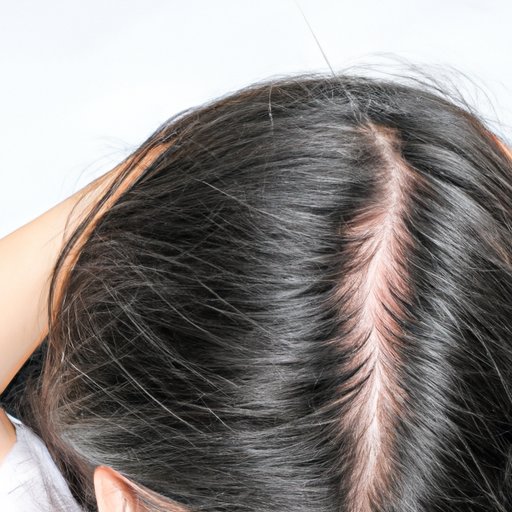Introduction
Itchy hair is an unpleasant condition that can leave you feeling uncomfortable and embarrassed. But what causes itchy hair in the first place? In this article, we will discuss the definition of itchy hair, how to identify and treat it, the different types of itchiness and the benefits of keeping your hair healthy.
How to Identify and Treat Itchy Hair
The first step in treating itchy hair is to understand the symptoms. Itching may be mild, moderate or severe depending on the cause. It can be localized to one area of the scalp or spread over the entire head. Other common symptoms include redness, flaking, scaling and bumps. If the itching persists for more than a few days, it is best to consult a doctor or dermatologist to determine the underlying cause.
Once the cause has been identified, treatment options can vary depending on the severity of the itchy hair. Mild cases can often be treated with over-the-counter anti-itch medications. Severe cases may require prescription medications or other treatments such as light therapy or steroid injections.

Causes of Itchy Hair and How to Reduce It
Itchy hair can be caused by a variety of factors, including environmental factors, hormonal changes, allergies and poor hair care practices. Here are some of the most common culprits:
Environmental Factors
Exposure to extreme weather conditions, such as cold temperatures or high humidity, can result in itchy hair due to dryness. The same is true of exposure to harsh chemicals, such as those found in pool water or hair products.
Hormonal Changes
Hormonal imbalances, such as those experienced during pregnancy or menopause, can also lead to itchy hair. This is because hormones can affect the production of sebum, the natural oil produced by the scalp.
Allergies and Irritants
Allergies and irritants can cause inflammation of the scalp, resulting in itchy hair. Common allergens include certain foods, fabrics, and even hair products. It is important to identify the allergen and avoid contact with it.
Poor Hair Care Practices
Improper hair care practices, such as using too much heat or not washing the hair regularly, can also lead to itchy hair. To reduce itchy hair, it is important to use the right products for your hair type and to follow a regular cleaning routine.
The Link Between Itchy Hair and Scalp Conditions
Itchy hair can also be a symptom of certain scalp conditions, such as dandruff, psoriasis and seborrheic dermatitis. These conditions can be difficult to diagnose, so it is important to see a doctor if the itching persists.
Dandruff
Dandruff is a common scalp condition that is characterized by flaking and itching. It is caused by an overgrowth of a fungus called Malassezia, which feeds on the oils produced by the scalp. To treat dandruff, it is important to use shampoos containing antifungal ingredients.
Psoriasis
Psoriasis is a chronic skin condition that is characterized by red, scaly patches on the scalp. It is caused by an overproduction of skin cells, which can cause itching, burning and pain. Treatment usually involves topical medications, light therapy or oral medications.
Seborrheic Dermatitis
Seborrheic dermatitis is a common scalp condition that is characterized by redness, itching and flaking. It is caused by an overgrowth of yeast on the scalp, which can be treated with antifungal medications.

Natural Remedies for Itchy Hair
There are several natural remedies that can help alleviate itchy hair. Some of the most popular remedies include apple cider vinegar, coconut oil and tea tree oil. Apple cider vinegar helps balance the pH levels of the scalp, while coconut oil and tea tree oil both have antifungal and antibacterial properties. These remedies can be applied directly to the scalp or mixed into a shampoo.

Different Types of Itchiness and What They Mean
Itchy hair can range from mild to severe. Mild itching is usually caused by environmental factors such as dry air or harsh chemicals. Moderate itching can be caused by allergies or poor hair care practices. Severe itching is usually a sign of a more serious underlying condition, such as a scalp infection or skin disorder.
The Benefits of Keeping Your Hair Healthy to Avoid Itching
Keeping your hair healthy is one of the best ways to avoid itchy hair. Eating a balanced diet, getting regular trims and using the right hair care products for your hair type are all essential for maintaining healthy hair. Additionally, avoiding harsh chemicals and using a gentle shampoo can help keep your scalp from becoming too dry or irritated.
Conclusion
Itchy hair can be an annoying and embarrassing condition, but it can usually be treated with over-the-counter medications or natural remedies. It is important to identify the cause of the itchy hair in order to find the best treatment for it. Keeping your hair healthy is also essential for preventing itchy hair. If the itching persists, it is best to consult a doctor or dermatologist.


